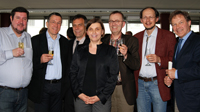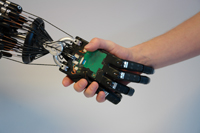© Universität Bielefeld
uni.news
Published on
15. Juni 2012
Category
General
Bielefeld University still twice excellent
Cluster and Graduate School to receive further funding
Bielefeld University is celebrating! The Cluster of Excellence on Cognitive Interaction Technology (CITEC) and the Bielefeld Graduate School in History and Sociology (BGHS) have been granted a further five years of funding. The announcement came today (15 June) from the German Research Foundation (DFG) and the German Council of Science and Humanities (Wissenschaftsrat).
 Rektor Professor Dr.-Ing. Gerhard Sagerer: ‘We are delighted with the decision. Once again, Bielefeld University shows that it is a top player and can hold its own compared to the best universities in Germany and the world. We are proud of this further recognition of our university with its strong research tradition and thank the academics responsible for these successful projects. It is their work and their passionate commitment that have first made this success possible’. The Cluster of Excellence CITEC and the Graduate School BGHS are being funded for five more years until October 2017 in the third and final round of the Excellence Initiative. The Cluster of Excellence CITEC has applied for 33.7 million Euros and the Graduate School BGHS for 6.6 million Euros.
Rektor Professor Dr.-Ing. Gerhard Sagerer: ‘We are delighted with the decision. Once again, Bielefeld University shows that it is a top player and can hold its own compared to the best universities in Germany and the world. We are proud of this further recognition of our university with its strong research tradition and thank the academics responsible for these successful projects. It is their work and their passionate commitment that have first made this success possible’. The Cluster of Excellence CITEC and the Graduate School BGHS are being funded for five more years until October 2017 in the third and final round of the Excellence Initiative. The Cluster of Excellence CITEC has applied for 33.7 million Euros and the Graduate School BGHS for 6.6 million Euros.
 The speakers for the projects receiving further funding – CITEC and BGHS – see this special day as an opportunity not only to look back over the previous funding period since 2007 but also to look towards the future. Professor Dr. Helge Ritter (CITEC) says: ‘Our renewed success in the Excellence Initiative is an important milestone for us and an incentive to pursue our work with even more vigour. The robot head Flobi developed in Bielefeld, our research on robot hands with manual intelligence, and the interactive virtual robots MAX and Vince have gained increasing international attention. With the new research team, we now want to find out how we can get a greater number of intelligent sub-skills to collaborate in such ways that the systems can fill in knowledge gaps by themselves, adapt to individual persons and tasks, and be helpful and useful aids in carrying out practical everyday tasks. This will help us to expand our very good international position even further and strengthen the cooperation between CITEC and both local partners and research institutes in Europe, Japan, and the USA’.
The speakers for the projects receiving further funding – CITEC and BGHS – see this special day as an opportunity not only to look back over the previous funding period since 2007 but also to look towards the future. Professor Dr. Helge Ritter (CITEC) says: ‘Our renewed success in the Excellence Initiative is an important milestone for us and an incentive to pursue our work with even more vigour. The robot head Flobi developed in Bielefeld, our research on robot hands with manual intelligence, and the interactive virtual robots MAX and Vince have gained increasing international attention. With the new research team, we now want to find out how we can get a greater number of intelligent sub-skills to collaborate in such ways that the systems can fill in knowledge gaps by themselves, adapt to individual persons and tasks, and be helpful and useful aids in carrying out practical everyday tasks. This will help us to expand our very good international position even further and strengthen the cooperation between CITEC and both local partners and research institutes in Europe, Japan, and the USA’.
 The Director of the Graduate School BGHS, Professor Dr. Thomas Welskopp, also draws a positive balance: ‘Currently, more than 200 graduate students are working on their doctorates at the BGHS and laying the foundations for their future careers. The range of dissertation topics extends from identity formation in Korean nurses working in Germany to using the example of birds as domestic pets to study the history of the relation between people and animals. The creative environment in which this Graduate School was founded attracts them to us and will radiate beyond the Excellence Initiative’.
The Director of the Graduate School BGHS, Professor Dr. Thomas Welskopp, also draws a positive balance: ‘Currently, more than 200 graduate students are working on their doctorates at the BGHS and laying the foundations for their future careers. The range of dissertation topics extends from identity formation in Korean nurses working in Germany to using the example of birds as domestic pets to study the history of the relation between people and animals. The creative environment in which this Graduate School was founded attracts them to us and will radiate beyond the Excellence Initiative’.
The proposal for a new Cluster of Excellence: ‘Communicating Comparisons: From the Onset of Modernity to World Society’ (ComCom) was not approved. Rektor Sagerer: ‘The academics involved in the projects put in a lot of good work, and I thank them for all their efforts. We shall have to wait for the expert reviews from DFG and the German Council of Science and Humanities and then decide what other types of funding are available to pursue these exciting projects in any case’.
Cluster of Excellence since 2007, further funding until 2017:
Cognitive Interaction Technology (CITEC)
The Cluster of Excellence CITEC is part of the interactive intelligent systems research profile at Bielefeld University. Its aim is to gain a better understanding of the mechanisms that enable human beings, animals, and artificial systems to act autonomously in complex environments and communicate with each other. More than 30 research teams from computer science, biology, linguistics, psychology, sports science, and physics are focusing their work on four topics: motion intelligence, attentive systems, situated communication, and memory and learning. The mission of scientists at CITEC is to develop user-friendly technological systems ranging from everyday appliances to robots that people can use intuitively.
Speaker: Professor Dr. Helge Ritter
Graduate School since 2007, further funding until 2017:
Bielefeld Graduate School in History and Sociology (BGHS)
Individuality, creativity, and initiative – these are major themes at the Bielefeld Graduate School in History and Sociology (BGHS). More than 200 sociology and history graduates are learning and researching together here under one roof. They profit from the wide range of topics at the BGHS. Media studies, social change, processes of historical and political transformation are just some of the main fields of research. Nonetheless, unusual doctoral projects such as the relation between the church and dance in the Middle Ages or the symbolism and function of tattoos are welcome at the BGHS. The BGHS is characterized by a culture of creativity and exchange in which young academics can build up solid foundations for their future careers.
Director: Professor Dr. Thomas Welskopp
The Excellence Initiative
The Excellence Initiative of the Federal and State Governments promotes outstanding science and research at German universities. The aim of the programme is to strengthen cutting-edge research at universities, to sustainably strengthen Germany as a location of higher education and science, to improve Germany’s international competitiveness, and to make the best of German science and research more visible in the scientific community. It was first announced in 2005/2006. The third and probably final phase of the Excellence Initiative covers the funding period from November 2012 to October 2017.
Bielefeld University is celebrating! The Cluster of Excellence on Cognitive Interaction Technology (CITEC) and the Bielefeld Graduate School in History and Sociology (BGHS) have been granted a further five years of funding. The announcement came today (15 June) from the German Research Foundation (DFG) and the German Council of Science and Humanities (Wissenschaftsrat).
Two good reasons to celebrate: Prof. Dr. Thomas Welskopp (BGHS), Prof. Dr. Alfons Bora (BGHS), Rektor Prof. Dr.-Ing. Gerhard Sagerer, Anita Adamczyk (CITEC), Vice Rektor Prof. Dr. Martin Egelhaaf, Prof. Dr. Helge Ritter (CITEC) and Chancellor Hans-Jürgen Simm.
Shake hands on it: The German Research Foundation (DFG) has approved a further five years of funding for the Cluster of Excellence CITEC at Bielefeld University. Manual intelligence is just one of the topics studied by scientists at CITEC.
The Bielefeld Graduate School BGHS hosts more than 200 graduates working on a broad range of dissertation topics from both history and sociology in an everyday climate of mutual inspiration and academic exchange.
The proposal for a new Cluster of Excellence: ‘Communicating Comparisons: From the Onset of Modernity to World Society’ (ComCom) was not approved. Rektor Sagerer: ‘The academics involved in the projects put in a lot of good work, and I thank them for all their efforts. We shall have to wait for the expert reviews from DFG and the German Council of Science and Humanities and then decide what other types of funding are available to pursue these exciting projects in any case’.
Cluster of Excellence since 2007, further funding until 2017:
Cognitive Interaction Technology (CITEC)
The Cluster of Excellence CITEC is part of the interactive intelligent systems research profile at Bielefeld University. Its aim is to gain a better understanding of the mechanisms that enable human beings, animals, and artificial systems to act autonomously in complex environments and communicate with each other. More than 30 research teams from computer science, biology, linguistics, psychology, sports science, and physics are focusing their work on four topics: motion intelligence, attentive systems, situated communication, and memory and learning. The mission of scientists at CITEC is to develop user-friendly technological systems ranging from everyday appliances to robots that people can use intuitively.
Speaker: Professor Dr. Helge Ritter
Graduate School since 2007, further funding until 2017:
Bielefeld Graduate School in History and Sociology (BGHS)
Individuality, creativity, and initiative – these are major themes at the Bielefeld Graduate School in History and Sociology (BGHS). More than 200 sociology and history graduates are learning and researching together here under one roof. They profit from the wide range of topics at the BGHS. Media studies, social change, processes of historical and political transformation are just some of the main fields of research. Nonetheless, unusual doctoral projects such as the relation between the church and dance in the Middle Ages or the symbolism and function of tattoos are welcome at the BGHS. The BGHS is characterized by a culture of creativity and exchange in which young academics can build up solid foundations for their future careers.
Director: Professor Dr. Thomas Welskopp
The Excellence Initiative
The Excellence Initiative of the Federal and State Governments promotes outstanding science and research at German universities. The aim of the programme is to strengthen cutting-edge research at universities, to sustainably strengthen Germany as a location of higher education and science, to improve Germany’s international competitiveness, and to make the best of German science and research more visible in the scientific community. It was first announced in 2005/2006. The third and probably final phase of the Excellence Initiative covers the funding period from November 2012 to October 2017.